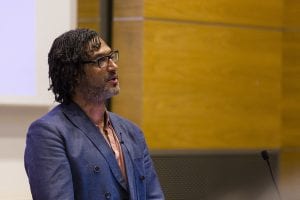UCL Events blog
By Nick Dawe, on 6 May 2011
Reviews of UCL public lectures, debates, exhibitions, shows, and more…
The 2018 UCL Neuroscience Symposium
By ucyow3c, on 15 August 2018
By Oriol Pavón, Wellcome Trust PhD student in Neuroscience
On Friday 22nd of June, just under 800 researchers gathered at the UCL Institute of Education to celebrate the 9th UCL Neuroscience Symposium. With two fantastic keynote speakers, six talks by UCL group leaders, and 129 posters spread across three sessions, the event was once again a big success that marked the culmination of another impressive year for the UCL Neuroscience Domain.
 The morning began with Dr Caswell Barry welcoming everyone and giving a brief overview of the day before proceeding to introduce the first speaker of the meeting: Prof Daniel Wolpert from Columbia University, who presented his work on “Probabilistic Models of Sensorimotor Control”. Prof Wolpert shared how his lab uses machine learning and Bayes theory to investigate human movement control, how we learn to manipulate tools, and what cognitive processes underlie decision making and having a change of mind. After the engaging Q&A session came to an end, Prof Michael Häusser introduced the winners of the Jon Driver Prize, awarded to outstanding young neuroscientists from UCL for their work during their PhD. This year’s awardees were Andrea Banino, for his work on “Neuroscience and AI: modelling the brain using deep neural networks”, and Ruben Duque do Vale, for his research on “Spatial navigation during escape behaviours in mice”, who both had the chance to present their work to the audience. Read the rest of this entry »
The morning began with Dr Caswell Barry welcoming everyone and giving a brief overview of the day before proceeding to introduce the first speaker of the meeting: Prof Daniel Wolpert from Columbia University, who presented his work on “Probabilistic Models of Sensorimotor Control”. Prof Wolpert shared how his lab uses machine learning and Bayes theory to investigate human movement control, how we learn to manipulate tools, and what cognitive processes underlie decision making and having a change of mind. After the engaging Q&A session came to an end, Prof Michael Häusser introduced the winners of the Jon Driver Prize, awarded to outstanding young neuroscientists from UCL for their work during their PhD. This year’s awardees were Andrea Banino, for his work on “Neuroscience and AI: modelling the brain using deep neural networks”, and Ruben Duque do Vale, for his research on “Spatial navigation during escape behaviours in mice”, who both had the chance to present their work to the audience. Read the rest of this entry »
David Olusoga’s 2018 Cities Imaginaries lecture on the UK’s ‘Orwellian’ housing situation
By ucyow3c, on 25 May 2018
Written by Jordan Rowe, Centre Manager, UCL Urban Laboratory
Historian, broadcaster and film-maker David Olusoga was invited to deliver the 2018 edition of the annual Cities Imaginaries lecture at UCL Urban Laboratory on 22 May.
In some ways, the lecture was a return to UCL for the Civilisations host, who collaborated extensively with academics in UCL History researching the legacies of British slave‑ownership, as part of a documentary series broadcast on the BBC in 2015.

At the UCL Urban Laboratory, Olusoga offered a thought-provoking historical journey through periods of housing crisis in the UK – contending that the problem is hard-wired into our cities. He questioned whether today’s levels of housing inequality and poverty may even eclipse that seen in the past.
Usually careful not to band around terms such as ‘Victorian’ or ‘Dickensian’, Olusoga made a point of mentioning that a comparison between our current situation and the Victorian era would be unfair, as we’re now at a point which is worse than that. Read the rest of this entry »
UCL Populations & Lifelong Health Domain Symposium
By news editor, on 22 May 2018
By Alice Welch, Fahreen Walji
The importance of a transdisciplinary approach to population health research has never been more important, stressed UCL’s Provost Professor Michael Arthur, as he welcomed attendees at the UCL Populations & Lifelong Health Domain Symposium.

Migration
Opening the session were two distinct accounts illustrating the vulnerabilities of migrant populations. Professor Sammonds described the natural and anthropogenic hazards facing migrants within two contexts and emphasised the need for “political will to solve the crisis”. He was followed by Professor Abubakar, who challenged the pervasive myths that exist about migrants and the societal implications of this. We then heard from Rachel Burns, an early career researcher, who highlighted the significant mortality advantage in migrants compared to the host population. Presentations from two other early career researchers followed; Dr Jeannie Collins presented her research on the increased risk of AIDS/death in migrant children on antiretroviral therapy, and Jean Stafford highlighted the substantial burden of psychosis in old age, particularly among females and migrant groups.
Our greatest challenge: supporting schools facing the greatest challenge
By ucyow3c, on 19 February 2018
The fifth in our ‘What if…?’ debates series, looking at how best to support the most challenged schools, featured the stellar line-up of the National Schools Commissioner, Sir David Carter, Sam Freedman of Teach First, Head of Passmores Academy (and ‘Educating Essex’) Vic Goddard, and Lucy Heller, Chief Executive of the international education charity Ark.
While the correlation between disadvantage and lower educational attainment is not 100%, it remains a strong one. This has been a central concern in education debate for some time, but it’s something we seem to take two steps forward and one step back on (some might say one step forward and two steps back). We asked our panellists: if you were Secretary of State, what would you do to crack this problem once and for all? This required some radical ideas; what we got was radical but also practicable (well, in theory at least – even the suggestion of moving Parliament to Sheffield; the upcoming re-fit does provide the opportunity, after all…).
 Close
Close

